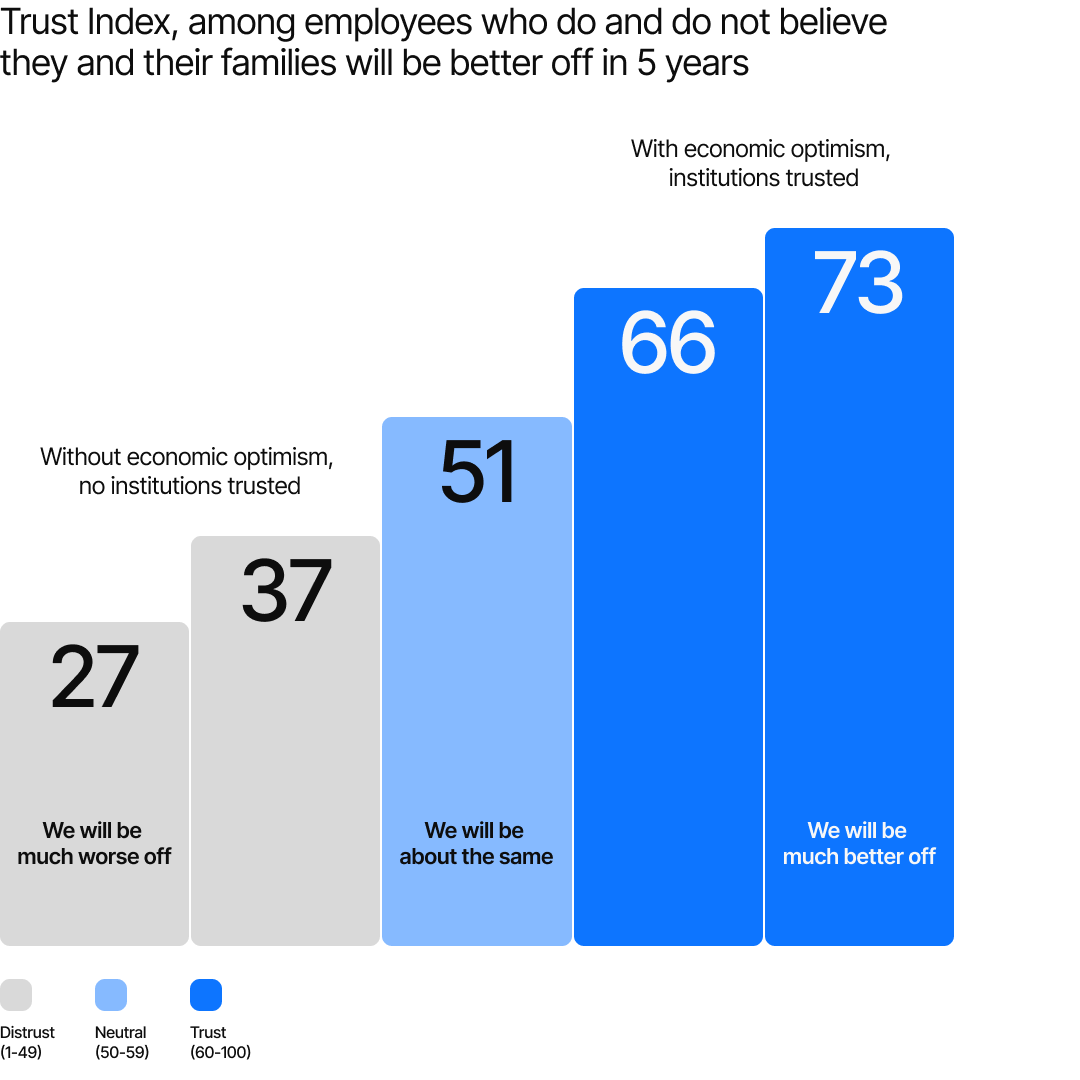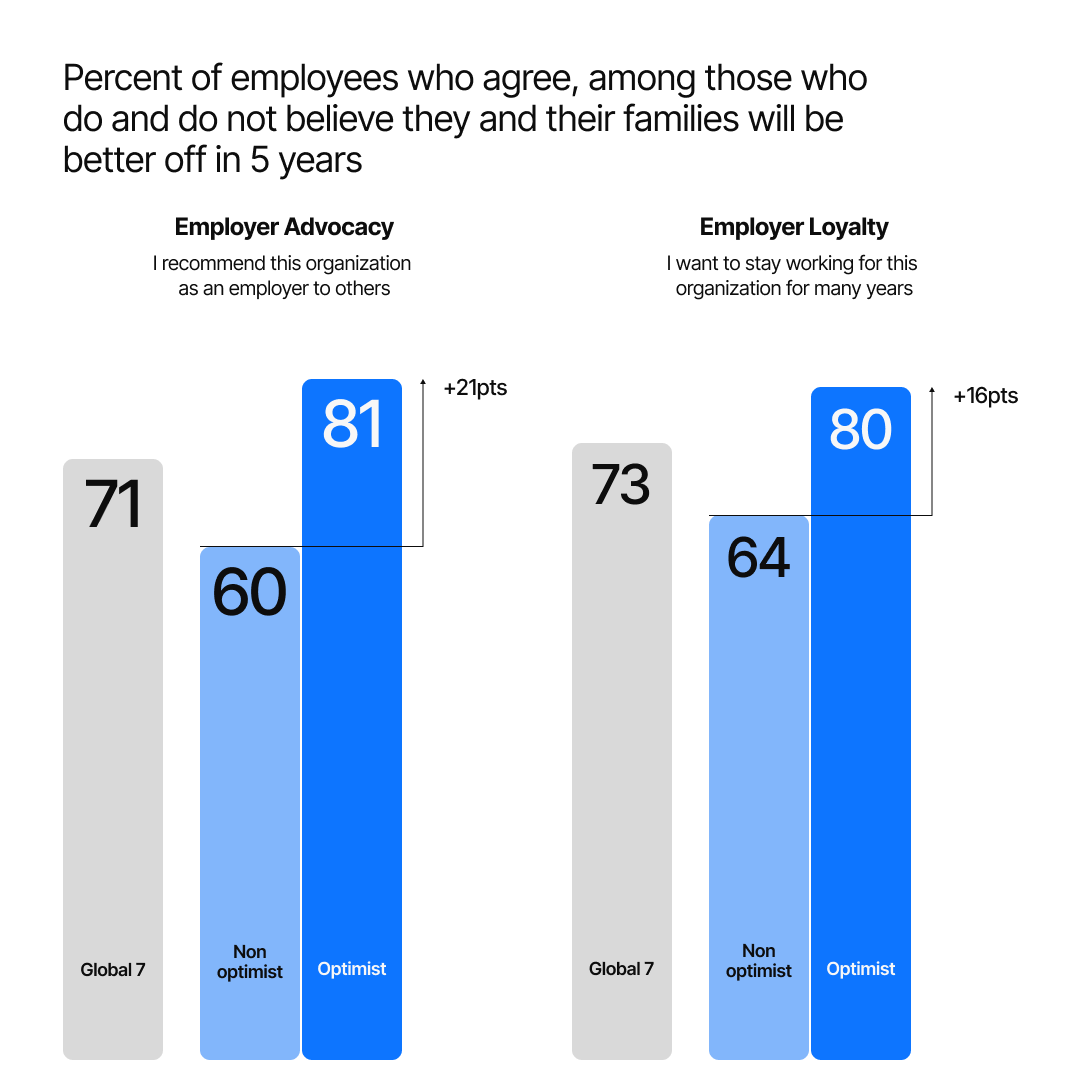A new polarization in the workplace
The 2024 ¥¨âøòÆóç Trust Barometer Special Report: Trust at Work reveals a new polarization in the workplace, marked by a widening gap between associates and executives in optimism about their personal economic futures. This chasm is affecting performance, productivity, and mental health, and employers have an opportunity to close it to increase trust throughout society.
Widening gap in economic optimism between associates and executives
Economic optimism among executives (EVP+) and associates (entry-level and non-managers) continues to diverge and associates feel left behind. Executives are 2.5 times more likely than associates to trust their CEO to tell the truth about what is happening within their organization, whereas associates are more inclined than executives to trust their coworkers. Notably, job level is a more powerful predictor of these trends than income.

Employers see upsides when employees have higher economic optimism
Economic optimists are more engaged at work, have higher productivity, more likely to advocate for and be loyal to their employer, and are more willing to embrace AI in the workplace.
Trust in institutions is dependent on economic optimism
As levels of trust correlate with levels of economic optimism, associates are also 32 points less trusting of institutions, on average across the four main institutions, than executives are.

.
Explore the findings

The workplace can unlock economic optimism and build trust in society
Close the economic optimism gap
Employees at the bottom of the organizational hierarchy have half the economic optimism of those at the top. When that gap is closed, associates are more likely to invest discretionary effort into their work.
Upskill to unlock economic optimism
Many employees feel displaced by technological and organizational transformations. Highlight the opportunities disruption creates by incorporating flexible skill development into career pathing.
Act, donãt talk
Through career pathing, impact and agency, there is a potential 24-point boost in associatesã optimism. When employees feel like leaders act on their behalf, they are more optimistic and engaged in their work.
Through employers, build trust in institutions
When work helps people feel economically optimistic, they are more willing to prioritize the greater good. Employers should feel empowered to address societal challenges by improving the workplace experience.
Explore the findings
.
Top Findings
01
"My Employer" is most trusted
ãý
Seventy-nine percent of employees surveyed globally say they trust ãmy employer.ã The only other institution in trust territory is business (66 percent trust among employees globally), while trust levels are neutral for NGOs (57 percent), government (55 percent) and media (52 percent).
02
Trusting employees earns trust for employers
ãý
When employees feel executive management does not trust them, they do not trust their CEO (only 25 percent trust), their manager (43 percent), or their head of HR (31 percent).
03
Employers expected to act
ãý
Employees on the left, center, and right politically are more likely to say that if a company were to publicly demonstrate a commitment to issues like healthcare access, gender equality, and climate action, it would make them more likely ã not less likely ã to work there.
¥¨âøòÆóç Voices on the Findings
.
Watch our launch event
A presentation of the report findings was conducted by ¥¨âøòÆóç's CEO, Richard ¥¨âøòÆóç, and Cydney Roach, ¥¨âøòÆóç's Global Chair for Workplace Advisory. Isabel Berwick, Host and Editor, "Working It" Podcast and Newsletter, Financial Times, then led a compelling discussion with Ali Goldsworthy, Author & Lecturer, Leadership for Society Program, Stanford University; Felicia Joy, Executive Vice President, Workplace Advisory, ¥¨âøòÆóç; Karin Reiter, SVP, Sustainability & ESG, The Adecco Group; Liba Wenig Rubenstein, Director, Aspen Business Roundtable on Organized Labor, The Aspen Institute.
Subscribe for our research and insights directly to your inbox:
Methodology
The 2024 ¥¨âøòÆóç Trust Barometer Special Report: Trust at Work is in its 4th year. The research was produced by the ¥¨âøòÆóç Trust Institute and consisted of 30-minute online interviews conducted between July 19 and July 25, 2024. Learn more >
8
Countries
Nearly 8,000
Respondents
Contact ¥¨âøòÆóç Workplace Advisory for a briefing
Workplace Advisoryãs approach is built on 25 years of research on what constitutes trust and our passion is driving that trust outwards from the workplace to the marketplace to create new value.








